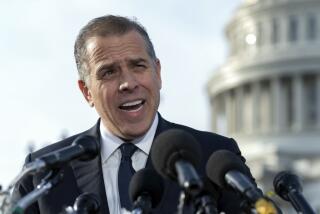CBS blog takes some swipes at NBC’s ‘Dateline’
- Share via
CBS’ criticism of a rival newsmagazine is raising questions about the network’s commitment to provide “transparency” in the wake of a flawed Dan Rather story about President Bush.
Through its Public Eye blog, CBS has been taking potshots at NBC News over a “Dateline” series that purports to catch suspected sexual predators.
NBC’s tawdry and voyeuristic “To Catch a Predator” on the newsmagazine series uses volunteers posing as minors to sexually entice adults in Internet chat rooms. When the suspect shows up for an arranged encounter, he (they are invariably men) is greeted by “Dateline” correspondent Chris Hansen, who springs the ultimate “gotcha!” with a camera crew in tow.
NBC has been working hand-in-glove with the activist group Perverted-Justice.com and, more recently, local law enforcement officials who lurk nearby, Miranda warnings evidently at the ready. Responding to criticism, “Dateline” anchor Stone Phillips defended the show’s methods (“Enticement? Yes. Entrapment? I don’t think so.”) in a February blog post.
On Tuesday, CBS Public Eye poster Brian Montopoli wondered anew whether “Dateline” “goes too far.” He alludes to controversy in Ohio over the latest in the “Predator” series, and quotes a journalism expert who refers to “several ethics issues involved in this.” Among the legitimate points raised by Montopoli and others: Should NBC essentially be serving as a tipster service for the police? Is it ethical to use subterfuge and hidden cameras to capture what lawyers call an inchoate -- that is, a presumably planned but never completed -- crime?
But CBS’ public lashing of the series raises some interesting questions of its own. This would seem a fairly significant breakdown in news division detente. Typically, networks have refrained from publicly criticizing rivals’ coverage, at least partly out of fear of what might happen if those rivals turned the tables. But at some point -- between, say, the time that Dan Rather’s Bush piece on “60 Minutes” was savaged by bloggers and Keith Olbermann and Bill O’Reilly declared war on each other -- the newsroom rules of engagement changed. Now it’s open season, and anyone can fire birdshot in someone else’s face.
It should be noted that Public Eye is edited by Vaughn Ververs of CBS Digital Media, who is meant to operate as a “conduit” between viewers and CBS News, and does not report to anyone at CBS News. However, the blog operates within the cbsnews.com domain and is part of CBS Corp.
On Thursday, Ververs took strong exception to a Channel Island posting raising questions about the “Dateline” attacks, writing: “Is Public Eye a vehicle for CBS to take ‘potshots’ at other networks? The answer, as anyone who’s spent more than a few minutes looking at us could easily discern, is no.... If anyone is taking potshots here, it’s [this column]. Or should I extrapolate in kind and just say it’s the Los Angeles Times taking aim at CBS?”
Because he raises the issue: What exactly is the role of Public Eye? We’ve spent more than a few minutes examining the site, and it’s still not clear.
Ververs points to the blog’s mission statement, which says that “Public Eye’s fundamental mission is to bring transparency to the editorial operations of CBS News -- transparency that is unprecedented for broadcast and online journalism.” As for criticizing rivals, this is all the statement has to say: “The Public Eye will wander outside of CBS as well. When stories about journalists and journalism are in the news, Public Eye will write and report about them.”
To that second sentence, the statement might have added: “on a highly selective basis.”
To its credit, Public Eye does yeoman-like work of the ombudsman variety -- for instance, questioning a Scott Pelley report on global warming, or revealing how an image on “48 Hours” was altered in violation of CBS policy. But, as in the “Dateline” case, the blog also attacks what it dubs “Other Guys’ Problems,” which is not at all the traditional purview of an ombudsman.
It’s fine to want to play media critic, although that role doesn’t always mix well with the job description of viewers’ representative. Public Eye may ultimately need to decide which master it wants to serve.
Channel Island is a blog about the television industry. For the latest posting, go to latimes.com/channelisland. Contact reporter Scott Collins at [email protected]
More to Read
The biggest entertainment stories
Get our big stories about Hollywood, film, television, music, arts, culture and more right in your inbox as soon as they publish.
You may occasionally receive promotional content from the Los Angeles Times.











